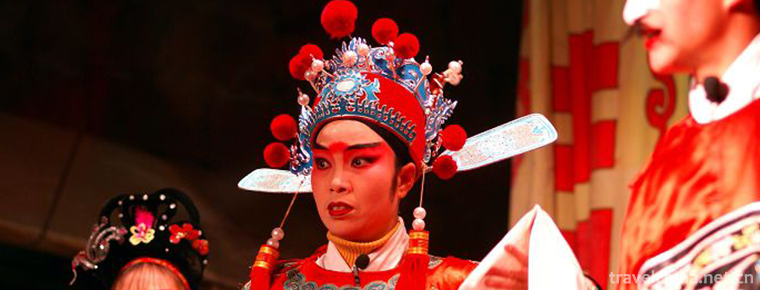Ming opera style
Ming opera style
Yiyang Opera, a local traditional drama in Yiyang County, Jiangxi Province, is one of the national intangible cultural heritage.
On May 20, 2006, Yiyang Opera was approved by the State Council of the People's Republic of China to be listed in the first batch of national intangible cultural heritage, numbered IV-5.
Cultural characteristics
The role of Yiyang tune is divided into Xiaosheng, Zhengsheng, Laosheng, Erhua, Sanhua, Xiaodan, Zhengdan, Laodan and so on. Its singing structure was initially composed of music and cards, accompanied by gongs and drums instead of orchestral accompaniment. The performer sings by one person and receives tunes by several people, thus forming a very distinctive singing mode of "unaccompanied song and gang tune" in the Ming Dynasty. Ye also developed a rolling tone to break the system of the combination of songs and cards, which further enhanced the dramatic and expressive power of the vocal music.
In the Ming Dynasty, literati and refined scholars seldom wrote, often adapted from the ready-made scripts of Kunshan Opera. The lyrics were popular, and the songs were easy to accept by the masses. Their singing style was solo singing by one person, accompanied by a group of people, only noisy gongs and drums and other percussion accompaniments, which was suitable for the field performance of Tongqu. Because it is widely popular among the people, and later developed into many tribes, long-term rivalry with Kunshan Opera. The legends of the middle and late Ming Dynasty are mainly Kunshan and Yiyang tunes.
Representational repertoire
Biyang Opera is divided into two categories: Liantai Opera and Legendary Book. The former includes Biography of the Three Kingdoms, Water Margin, Yuefei Biography, Mulian Biography and Fengshen Biography. The latter includes Qingmei Club, Gucheng Club, Dingtianshan, Jinmingji, Pearl Story and Water Selling Story.
Epidemic areas
Yiyang Opera is mainly inherited in Guixi, Wannian, Leping, Poyang, Fuliang, Shangrao and other areas in Jiangxi Province. It was spread in Anhui, Jiangsu, Zhejiang, Fujian, Guangdong, Hunan, Hubei, Yunnan, Guizhou and Beijing in the early and middle Ming Dynasty.
Inheritance and Protection
Inheritance value
Yiyang Opera is a wonderful flower of Chinese traditional culture. Its contribution to the development of Chinese opera, especially local opera, is irreplaceable.
Current situation of inheritance
Over the past two decades, due to various reasons, the inheritance of Yiyang Opera has entered a dilemma. The performing troop has been seriously aging, the name of the troupe has survived, and many excellent plays and singing tunes are on the verge of being lost. Even in its popular place, Yiyang Opera has been unable to meet the audience for many years and has fallen into an embarrassing situation that has been forgotten.
Heritage figures
Lin Xihuai, female, Han nationality, on May 8, 2018, was selected as the fifth batch of representative inheritors of national intangible cultural heritage projects, the representative project: Yiyang Tune.


-
1.Harbin Sun Island Scenic Area
Sun Island Scenic Area is located on the North Bank of Songhua River in Harbin City, Heilongjiang Province, with a total area of 88 square kilometers, of which the planned area is 38 square kilometers
Time 2018-12-05 -
2.The Peninsula Shanghai
Shanghai Peninsula Hotel is located on the Bund, which has a long history. It is the only new building on the Bund in 60 years. It can enjoy the Grand View of the Bund, Huangpu River, Pudong
Time 2018-12-16 -
3.Sun Yatsen Memorial Hall
Zhongshan Memorial Hall is located in Dongfeng Middle Road, Yuexiu District, Guangzhou City, Guangdong Province. It was built by the people of Guangzhou and overseas Chinese to commemorate Dr. Sun Yat
Time 2018-12-22 -
4.Maoling Museum
Maoling Museum is located on the Wuling Platform between Xianyang and Xingping in Shaanxi Province, about 40 kilometers away from Xi'an. It is a Museum of Dynastic History of the Western Han Dynasty
Time 2019-02-07 -
5.Guwo Yushu Samurai Dance
Samurai dance is a unique style of etiquette folk dance spread in Yushu. It is called Guowa (or Guowa) in Tibetan. Guo refers to weapons in Tibetan. It means warriors with weapons. Wo refers to dancer
Time 2019-05-02 -
6.Qingyang Opera
During Jiajing period of Ming Dynasty, Yiyang Tune of Jiangxi flowed into Qingyang County of Chizhou Prefecture in Southern Anhui Province. It was combined with local language, folk opera (Kunshan Tun
Time 2019-06-11 -
7.Hainan opera Qiongju Opera
In June 2008, Qiongju Opera declared by Hainan Qiongju Theatre and Haikou City was listed in the second batch of national intangible cultural heritage list with the approval of the State Council.
Time 2019-06-11 -
8.Tujia Waving Dance
Hand-waving dance is an ancient traditional dance of Tujia nationality. It mainly spreads in the Youshui River and Wujiang River basin at the junction of Hubei, Hunan, Chongqing and Guizhou. It mainly
Time 2019-06-23 -
9.Beijing University Of Agriculture
The predecessor of Beijing University of Agriculture, Tongxian agricultural school, Hebei, was founded in 1956. In 1958, Tongxian agricultural school in Hebei province was merged with Beijing agricult
Time 2019-09-06 -
10.University Of International Business And Economics
The University of Foreign Economic and Trade is a national key university directly under the Ministry of Education. The first batch of "211 Project" and the first batch of "double first
Time 2019-09-22 -
11.Xiling Snow Mountain
Xiling Snow Mountain, located in Dayi County, Chengdu City, Sichuan Province, is only 95 kilometers away from Chengdu, with a total area of 483 square kilometers. It is a world natural heritage, giant panda habitat, AAAA tourist attraction and national key scenic spot.
Time 2020-11-06 -
12.Needlework of Chinese embroidery
Category: random needling, straight needling, disc needling, trowel needling, grabbing needling, flat needling, scattered wrong needling, weaving embroidery, applying needling, auxiliary needling, variant embroidery
Time 2020-12-12